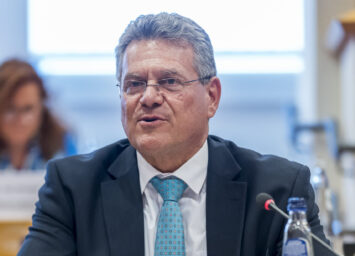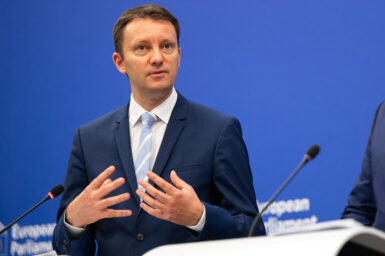A heartfelt debate on the future of Europe’s carmaking was heard at last Wednesday’s plenary session of the European Parliament. The strongest faction, the EPP appears ready, even if with little enthusiasm, to go along with the European Commission’s plan; so is Renew. With the Socialists apparently sitting on the fence, the Patriots, the Conservatives, the Greens and the fringe groups oppose it with varying doses of vigour.
Few MEPs seemed very happy about the Industrial Action Plan for the European Automotive Sector during last Wednesday’s Strasbourg debate on the hot topic. Some excoriated the EU executive arm for keeping too much of the Green Deal in the plan, others bemoaned the initiative for removing too much. Another working day, you might as well say.
The packed hall heard the opening remarks by Adam Szłapka, Poland’s European Affairs Minister, and Apostolos Tzitzikostas, the European Commissioner for Sustainable Transport and Tourism. Both men introduced the topic.
“Let us simply remind ourselves that the automotive industry supports millions direct and indirect jobs in the European Union,“ Mr Szłapka said before exhorting the MEPs to treat the proposal swiftly, because that is what the Polish Presidency would do, too.
You might be interested
Ambition and reality
Mr Szłapka said that the Council had yet to examine the action plan and its various proposed actions, and that the Commission would present the plan at the Competitiveness Council meeting on the same day. Time matters, he suggested. “We understand that the proposal will be tabled soon. The Polish Presidency will treat this proposal swiftly and as a matter of priority. We count on the Parliament to do the same. It is essential to provide the industry with certainty without any delay,“ the Polish EU Minister said.
Mr Tzitzikostas used his time ten-minute allotted time-slot in full, presenting the Commission’s perspective. “We already have the finance to turn ambition into reality,“ he said. The money consists of up to €50bn under InvestEU for clean tech and clean mobility; €1.8bn from the Innovation Fund for battery manufacturing; €1bn from Horizon Europe for connected and autonomous vehicles and batteries; €570m under the Alternative Fuels Infrastructure Facility for charging points with a focus on trucks; €90 million from Erasmus+ for training and, of course, additional funding for SMEs.
The Commissioner went on to stress that “the action plan will ensure that the next generation of vehicles is not just made in Europe, but innovated in Europe, powered by European technology and built on European values“. Short on detail, however, he offered few clues as to how to achieve the lofty goal, or even what precisely the rather vague wording meant.
The EP’s factions then voiced their positions on the plan. Jens Gieseke MEP (EPP/DE) voiced a mild approval of his faction, spiked with some serious reservations. “No one would understand if, in these hard times of factory closures and waves of redundancies, fines were also to be imposed. The Commission must put the proposal on the table by the end of the year, as announced. We need to move faster,“ he said.
However, Mr Gieseke was careful not to give the Commission too broad an okay. “But although the action plan contains many positive elements, it is not the hoped-for big hit. Instead, it remains vague and inconcrete; just announcing that the review should be brought forward is not enough,“ the German MEP said. “For the EPP, it is clear: we need a comprehensive approach, full technology neutrality until 2035, and recognition of the role of plug-in hybrid electric vehicles.“ Full technology neutrality would soon turn out to be one of the key points of contention among the MEPs.
Just like Nokia
Mohammed Chahim MEP (S&D/NL), speaking next on behalf of the Socialists, was a trifle less forgiving. “I must say that nostalgia is good, but not if it lets you stick in the past,“ he offered an unexpected insight into the workings of the automotive sector.
Then the Dutch member continued with an unflattering comparison. “Today, I feel like I’m in the boardroom of Nokia when the iPhone was just released. The touch screen, the ability to browse on the internet and play music – it was revolutionary. The response of Nokia was to try to make the keyboard phone more attractive instead of responding to innovation – and we all know how that story ended. Because by allowing carmakers to not fulfil the mid-term goal it’s like telling Nokia to keep on producing the keyboard phone,“ he said.
This meandering argument transpired to go against the Commission’s move to relax some of the regulations the car industry considers too strict. “With these plans, with these delays to switch to zero-emission vehicles in Europe, I only see two winners: the companies that are lagging behind, that are only looking at short-term gains, and China, who already leads the EV market and sees the competition sabotaging itself.“
Mr Chahim then offered a diagnosis of what is holding Europe’s carmaking back: “Just like Nokia, it’s the lack of innovation that threatens our future, not the goals we’ve set eight years ago.“
Stop feeding Elon Musk
Some of his fellow members voiced criticisms of the Commission, similar in intensity, even if in different directions. Klára Dostálová MEP (PfE/CZE) spoke for the Patriots, calling for “respect for economic reality“. “Unfortunately, this action plan is not the solution. It is a step towards the economic decline of Europe,“ she voiced her factions‘ view of “the Brussels bureaucracy that has decided to bet everything on one card – on electric cars“.
Her fellow Czech member Alexandr Vondra MEP (ECR/CZE) then spoke on behalf of the Conservatives along similarly critical lines. He opened his remarks with a surprising linguistic message: “Madam President, I am going to speak in Czech because the European Commission’s policy towards the automotive industry is disastrous for my country,“ he said, leaving the MEPs in the dark as to his language choice in the case he liked the proposal better.
Mr Vondra voiced some serious criticism of the plan. “(This) disaster is unfolding. It amounts to fattening China and Elon Musk with European taxpayers’ money. Even the Commission is now realising this and is beginning to correct what it has imposed on us,“ he said. “What is at stake now is three things. Firstly, spreading the fines over three years is not enough; we need more. At least five years. Second, the unilateral fixation on electromobility must end. We need to go down the road of true technological neutrality (…) And thirdly, a review in 2025 is fine, but you are not addressing trucks at all.“
Cardinal sin
Gerben-Jan Gerbrandy MEP (Renew/NL) of Renew urged the Commission to speed up the process of green transition. First, he revealed his faction’s diagnosis of what has gone wrong: “The basic problem is that the European car industry switched to electric vehicles far too late. We all know that clinging to outdated technology for too long is an industrial cardinal sin.“
“The industry must then stop delaying, as they are currently doing behind the Commission’s back in an attempt to postpone the proposals,“ Mr Gerbrandy suggested a remedy. “If we do not accelerate towards electric vehicles now, in a few years’ time the lights could be switched off in every single European car factory,“ he issued a dire warning. Other members of his faction would later be more openly welcoming, saying that “we are behind the plan in all of its provisions“ (the French MEP Pascal Canfin).
It fell to the Greens to criticize the Commission from the other side. Michael Bloss MEP (Greens-EFA/DE) attacked the executive with unusual ferocity. “The number of new electric car registrations in Europe rose by 37 per cent in February. What are you doing? You are undermining this trend by attacking the Green Deal. You are bowing to a lobby campaign against rules that have been known about for eight years,“ he said sternly. “Congratulations! This is a great way to destroy your industry,“ Mr Bloss said before pledging opposition to the plan on the grounds that “we Greens are fighting for the future“.
Too much, or not enough?
Sharp criticism was heard from the Left as well. Jonas Sjöstedt MEP (The Left/SWE) mentioned that “the jobs of the future in the car industry will not be created with yesterday’s technology“, joining the ranks of those complaining to the EC about the perceived reduction of its original environmental ambitions.
The parliament’s smallest faction, the ESN also decried the EC move – this time around, however, for going too green too fast. Marcus Buchcheit spoke on behalf of his party colleagues: “How can you take away from companies the very niche that has allowed them to become market leaders over decades, namely the combustion engine, and take away the entrepreneurial freedom that ultimately leads them to success?“ he asked.
Mr Buchheit’s warrior spirit the got the better of him and the German CSU member resorted to an impromptu biological classification of his opponents. “If the EPP and the Commission want this change towards pragmatism, away from the controlled economy and towards entrepreneurial freedom, then it can only be with us, and it can only be in the face of the green louse that the EPP will please shake off.“ He got away with it.
As is customary, he composition of the debaters reflected the representation of the political groups in the Parliament. The plenary session heard 43 speakers, thirteen of whom from the EPP. Most of them toed their party lines relatively closely.
See you in April
The session was also treated to a lofty speech by another German MEP, Lukas Sieper: „Madam President, dear people of Europe, imagine Karl and Bertha Benz sitting here in our Chamber today, listening to our debate on the future of the automotive industry. Karl – the visionary, the man who invented the car – would probably shake his head and say, ‘Again, the same old arguments’,“ he said rather aptly. Sadly, Mr Sieper being a non-aligned member (NI, or Non-Iscrit), his ideas are likely to go down in history as a mere footnote to last Wednesday’s debate.
Minister Szłapka then closed the debate. “I have listened carefully to your interventions, and it seems clear that the importance of the automotive sector for the EU economy cannot be overstated,“ he said.
The Parliament is to hold a floor vote on the Action Plan in April. For its part, the Commission promised to advance the regulatory review, originally due in 2026, to be done this year.








